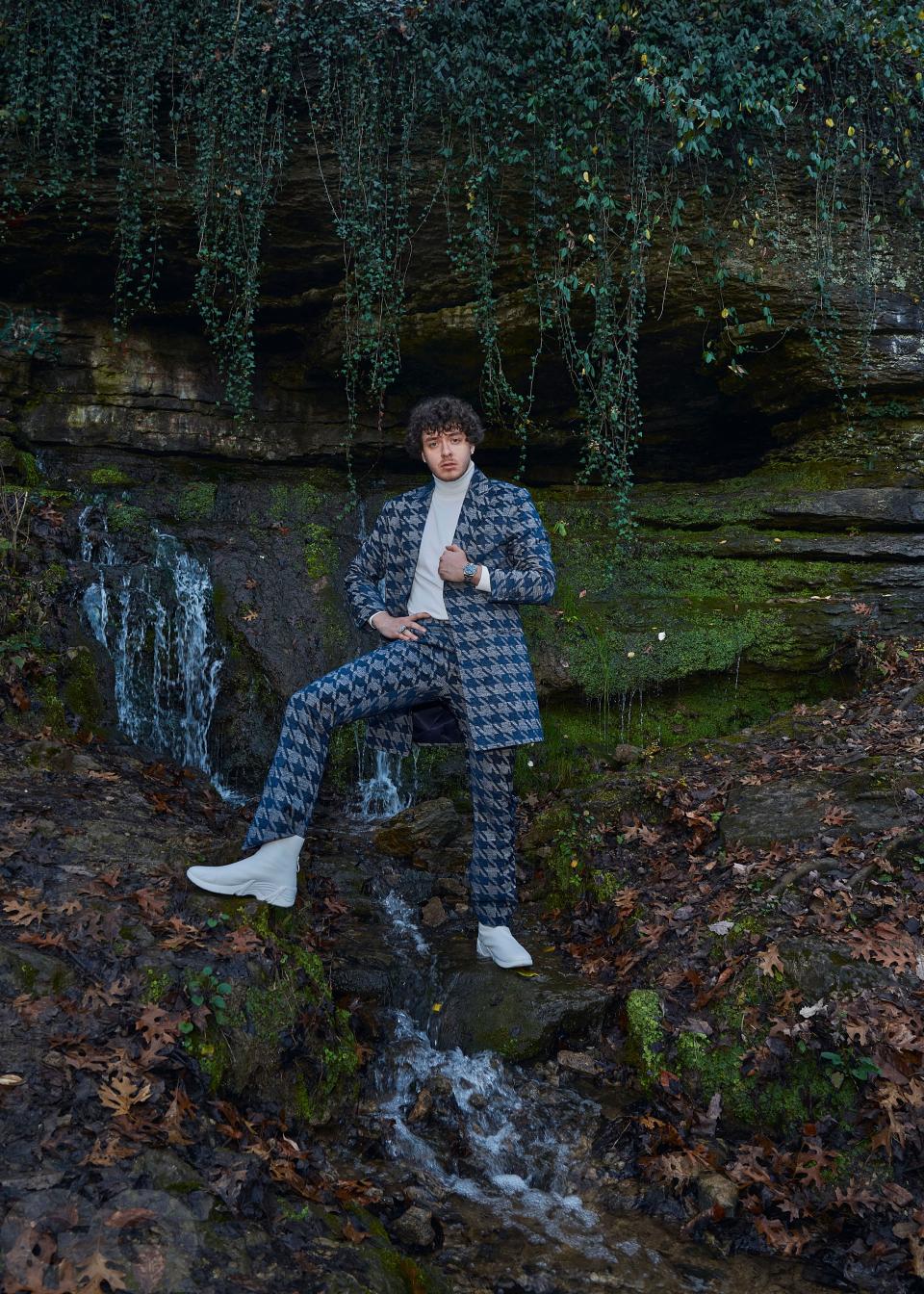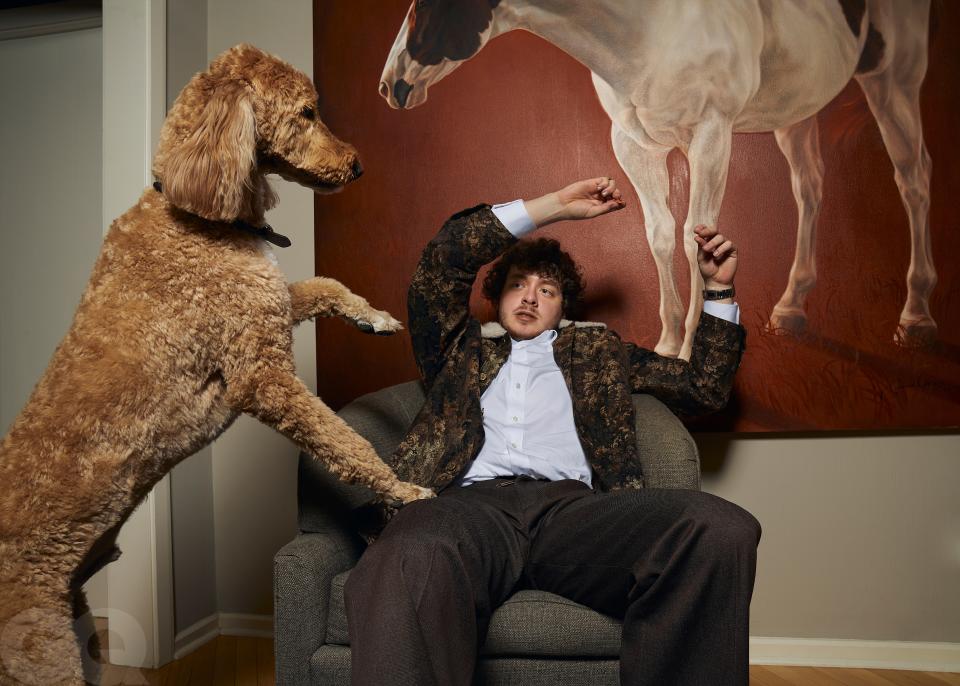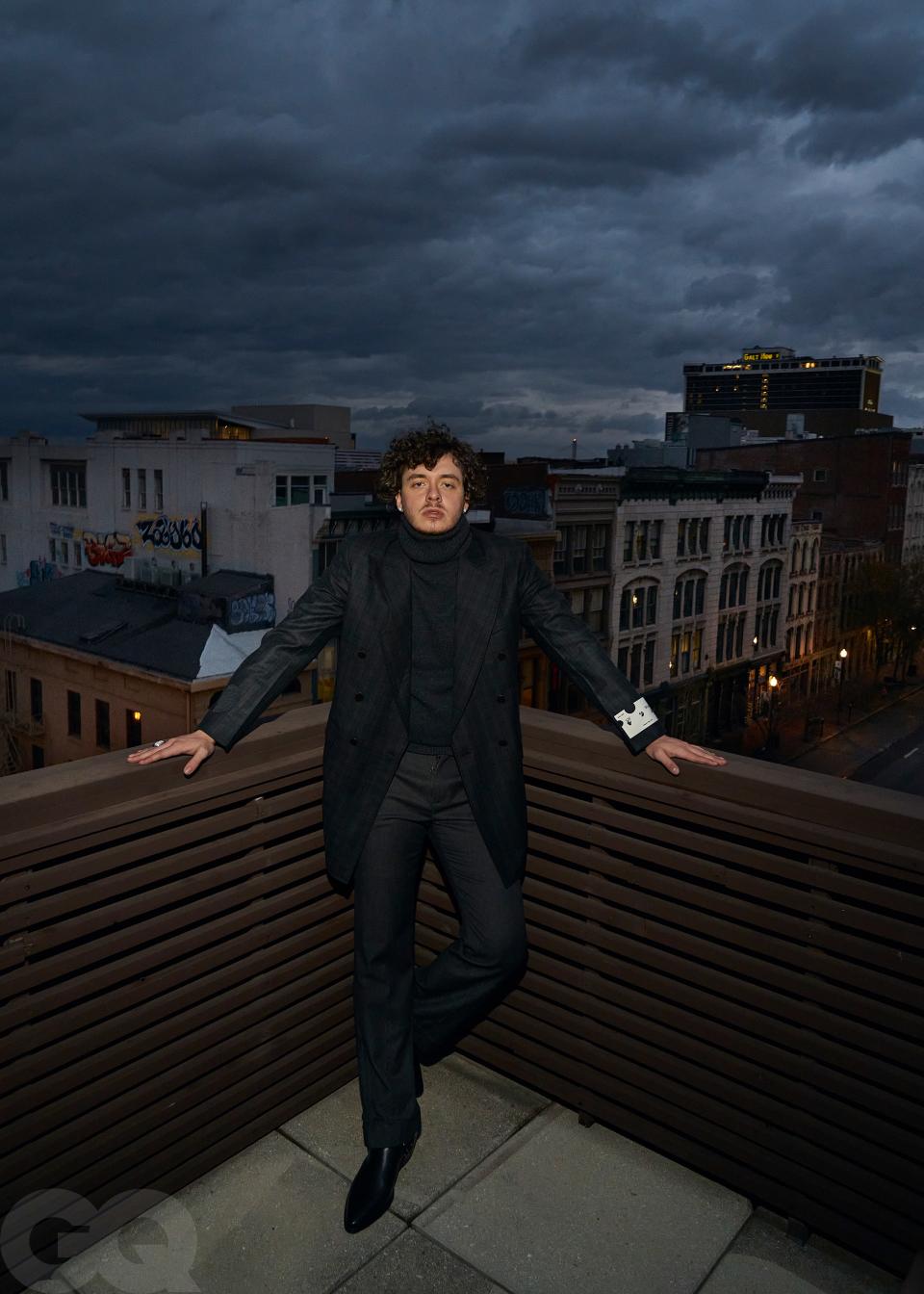Jack Harlow Is Serious About This
- Oops!Something went wrong.Please try again later.
Somewhere amidst the green hills of West Virginia, in the kind of club that offers bottle service to its VIP customers, there’s a woman in possession of Jack Harlow’s heart.
He flew into Pittsburgh—the nearest major airport—before driving into the wild and wonderful heart of Appalachia for a club appearance. At the club, he met a bottle girl who stopped him cold. If you were unaware that West Virginia had bottle girls, so was Harlow. “I found out just shortly before you did,” he deadpans over a video-less Zoom call.
She’s been on his mind since, and because everything in Harlow’s lyrics really happened, she’s in his music, too. Track three on his debut album Thats What They All Say, his first full-length release since his smash single “Whats Poppin” (and its star-studded remix) shot up to No. 2 on the Billboard Hot 100 and garnered a Grammy nomination for Best Rap Performance, to be precise.
Thats What They All Say will likely be one of the biggest albums of the year, and the bottle girl makes her cameo early, on “21C/Delta,” a mellow two-part journey into 21st century romance as experienced by a 22-year-old rap star who claims few vices outside of sex. In fact, Harlow is something of a strip club aficionado—when the Los Angeles Clippers point guard Lou Williams was allowed to leave the NBA bubble in July to attend a memorial service, it was Harlow’s Instagram photo that revealed that Williams had also found time to stop by Atlanta’s legendary Magic City. According to Harlow, there are no hard feelings and the video for his single “Tyler Herro” was shot on Williams’ home basketball court.
But he’s too decent a guy to say anything more about his brief encounter in Appalachia. “I don't want to ruin this person's life,” he says. Fingers crossed, this will not devolve into a “Courtney from Hooters on Peach Street” situation.

Harlow was introduced to hip-hop around age seven by his mother Maggie, who played The Marshall Mathers LP and other landmarks of the genre while driving around their home of Louisville, Kentucky. Her trip to buy Kanye West’s Late Registration is one of his earliest memories. “She told me all the words I was about to hear but wasn't allowed to say,” he told me. Around the same time, he remembers his teachers praising his writing. “In first grade, I was writing personal narratives and persuasive letters,” he says. “That's when I knew I enjoyed words.”
After years of adolescent grinding in the mixtape circuit in Louisville, supported by his parents and grandmother, Harlow recognized that in order to progress he needed to be at the center of American music culture. So in 2017 he moved to Atlanta, where he met hip-hop veterans DJ Drama, Don Cannon, and Leighton “Lake” Morrison, who signed him to their label Generation Now in 2018. The mixtapes and EPs he made in Kentucky often felt too try-hard, both in terms of the attempts at comedic wordplay (“Like blue jeans at the state fair, I might cut you off straight mid-sentence”) and the self-seriousness that Harlow deployed as a counterbalance (a ride past his elementary school on “Eastern Parkway” becomes an opportunity for a belabored metaphor about states of matter). He describes those early records as “forcefully goofy,” so much so that he felt uncomfortable playing the music “in front of girls.” Atlanta gave his music a new sense of nonchalance; he learned to relax his grip.. “I'm doing a much better job of representing who I am off record, on record,” he says.

“I’m signed to the gatekeepers,” Harlow raps on the intro to Thats What They All Say. Often when gatekeepers are invoked in rap, it’s to decry the (white) executives, radio programmers, and members of the Recording Academy who prevent authentic music from truly succeeding, or, conversely, amplify the wrong things. But for Harlow, gatekeepers means Black men with impressive industry bona fides who vouch for him. Drama hosted the Gangsta Grillz mixtape series, where Lil Wayne did some of his most sublime work; Cannon produced a number of the highlights across those mixtapes; Lake managed both Drama and Cannon, along with the aughts R&B star Bobby Valentino for a period.
“I don't know if [credibility] is a requirement to have success, but it's important to me,” Harlow says. “When I was shopping around before I signed I wasn't like, ‘I’m not signing until I find some Black gatekeepers.’ But I’m proud to be signed to them.” Cannon says “gatekeeper is simply a word that says, ‘Hey, you belong here’”; Lake says that Harlow is “driven and trying to move in an urban space, and one thing that I appreciate about him is he's open to a conversation.”
A successful white rapper will always have to reckon with the fact that their skin color lends a commercial advantage. But these are times of particularly intense scrutiny about the ethics of cultural appropriation. The release of the artwork for Thats What They All Say, which depicts Harlow signing autographs for a racially diverse group of children while sitting in a luxury vehicle next to a faceless brown-skinned woman, prompted much ado on social media. But rather than, say, rush out a Macklemore-esque apology, he’s not sweating it. Harlow’s touch stays light.
Not everyone has welcomed his rise: In 2019, labelmate Lil Uzi Vert posted a photo on Instagram of Harlow with a clown emoji superimposed over his face after Harlow made his support of the label clear in response to Vert’s criticism of it. (Lake says he appreciates Harlow’s solidarity.)

Harlow wants his name (and debut) to be mentioned among greats like Drake and Kendrick. The wide audiences they found and the respect they commanded for their technical abilities—he wants those things too. Drama, Cannon and Lake push him: 48 hours before Thats What They All Say was supposed to be completed, Harlow says Drama told him that “the greats would do a new intro.” In the final hour, Harlow recorded “Rendezvous,” a bars-forward salvo that sets the tone for the level of candor found in the album’s best moments. Cannon, who thinks “all the greats are honest,” encouraged him to rap with increasing frankess—a key skill in the age of the vulnerable rapper. “Nobody really knows who you are,” Cannon remembers telling him. “We have to know who you are, whether we like it or not. Whatever comes out, that's going to be our truth.”
Thats What They All Say is a concise coming-of-age story that marks significant improvement from his previous work. He’s trying the right amount, and the humor feels natural rather than overdetermined. When he raps with Lil Baby, the star of hip-hop in 2020, he doesn’t sound out of place. But above all, the project is animated by Harlow’s belief that he can be “honest about anything.” That can mean sexual adventures like the story of the bottle girl, or mishaps like the digital-era tragedy on “Way Out”: “I’m in the mountains out west on the tour bus texting a chick I used to mess with/Got her in the bed doing video shoots, tried to send one to me but it didn’t go through: damn.”

But Harlow can also be reflective about his flaws (he’s been seeing a therapist recently). He recounts running into someone he used to sleep with at a party for over two-and-a-half minutes on “Funny Seeing You Here,” an X-ray of early-twenties awkwardness that culminates with Harlow’s admission that, as a romantic partner, he can fall short:
You used to say her man was trash and tell me about the way he’d act
I would shake my head until I realized I’m the same as that
Now I wonder do she tell her man that I’m a trash dude
And would he shake his head until he realized that he was trash too?
On the album’s outro, “Baxter Avenue,” he stops pondering the vicissitudes of casual humping and turns his attention to race and his mixed crew. “Always wondered to myself if I could really be the leader to a group of brown-skinned boys when I’m not brown-skinned,” he raps before clocking the differences in their upbringings. Sounding genuinely unsure, he raps about wanting to share his success and wealth, and wonders what it would look like to do that fairly. He says it’s the kind of song that will be “tough to sit in a room and have other people hear.” According to Cannon, that’s exactly the sort of honesty he pushed Harlow toward.
The song will start a conversation, something Harlow relishes. On the day he released the album artwork, the invite-only, audio-led social media app Clubhouse, which has become more and more popular as a gathering place for music industry real talk, hosted a vigorous debate about it. “I didn't tune in for a second,” Harlow says. “But a lot of people I’m close to did. There's no way we could have dressed that cover up, race-wise, without causing a discussion. If they had been all white, it would have been ‘Why are you whitewashing?’ If it had been all Black, it’s like, ‘Where’s the white people?’” Harlow thinks the cover reflects the city and scene he comes from. “If you come to our parties or the kickbacks we have with 20 people, it looks like [the cover].”
Lake chalks the conversation up to “everybody's in the house and has nothing but time.” Though he acknowledges that Harlow’s trio of label execs don’t always agree on his artwork choices, he says the critics “thought about [the artwork] in way more detail than Jack did. People that don't know Jack would maybe question it, but if you know him, that's him, 110%. He's a white artist in a Black genre, and he's attracted to women of all races, colors, creeds, everything.”

If you still take issue with his decision to cast a faceless Black woman as his love interest, the title is directed at you: Thats What They All Say is meant to be an all-purpose retort. “It’s how I feel about any criticism or praise that I'm receiving,” Harlow says. “You really can't tell me anything I haven't heard before.”
Still, he does hear it. Though he’s stopped searching his name on Twitter, he hasn’t stopped reading his reviews and knows he’ll take in the latest round of press. (He doesn’t need the WiFi password to recall the 5.6 Pitchfork score for his 2019 release Confetti.) “I’m just too much of a narcissist,” he says. “I always catch ‘em.”

At one point on Thats What They All Say, Harlow says that “all the rappers I love most at one point got called a fake.” Among others, he means Drake. From the occasional singing to the subject matter, Harlow is a student of the great Canadian, and he has Drake’s confidence too. Accusations of fakery never slowed Drake—he only became more powerful. Reflecting on Drake’s ability to overcome gives Harlow comfort. Like Drake, Harlow works hard at this. His seriousness is part of what makes it possible to root for him. That he’s more interested in reconnecting with the West Virginia bottle girl than trying to resolve the ills of the world with his music doesn’t hurt either.
PRODUCTION CREDITS:
Styled by Metta Conchetta
Originally Appeared on GQ

